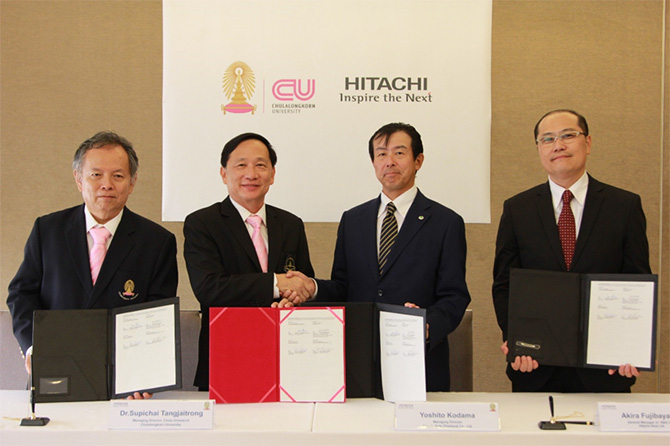Information contained in this news release is current as of the date of the press announcement, but may be subject to change without prior notice.
Hitachi and Chulalongkorn University agree on a cooperative relationship for social innovation in Thailand (PDF Type, 216kByte)
บริษัทฮิตาชิและจุฬาลงกรณ์มหาวิทยาลัยตกลงความสัมพันธ์ร่วมมือกันเพื่อนวัตกรรมทางสังคมในประเทศไทย (PDF Type, 206kByte)
February 26, 2020
Hitachi and Chulalongkorn University agree on a cooperative relationship for social innovation in Thailand
Bangkok, February 26, 2020 – Hitachi, Ltd. (TSE: 6501), Hitachi Asia Ltd., and Hitachi Asia (Thailand) Co., Ltd. (collectively “Hitachi”) today announced the signing of a Memorandum of Understanding with Chulalongkorn University to cooperate on defining the societal challenges that may affect Thailand’s future society and to identify possible solutions to those challenges. This agreement lays the groundwork for Chulalongkorn University and Hitachi to work together to contribute to the development of human resources in digital and design field, and the advancement of societal infrastructure in Thailand.
With unpredictable and volatile changes occurring in today’s global market, there is increasing uncertainty into what the future may bring. In Thailand, new solutions tailored to the region’s needs are being sought as concerns rise towards risks such as financial decline resulting from an increasingly aging population or structural transformation of industry.
Hitachi and Chulalongkorn University will be using Hitachi’s “Kizashi” methodology to define future trends in Thailand, and how peoples’ values may change, and from there identify opportunities for new business growth that will bring new value to future Thai society.
“Kizashi” which means “glimpse of the future” in Japanese, is also the name given to the design methodology cultivated from Hitachi’s holistic design approach in products, information and services. Specifically, it starts with a collection of environmental analysis data on political, economic, social and technological (PEST) factors. Based on PEST analysis (2) of documents and digital data, the data sets are then combined to anticipate the future and extract changes in peoples’ values in the form of precursors or “glimpses of the future.” The analyzed factors are applied to a timeline to identify future directions and trends. Through the collaborative project, Hitachi and Chulalongkorn University will examine the following.
(1) Future trends in Thailand will be investigated using Hitachi’s “Kizashi” methodology. The results will be evaluated together with students from Chulalongkorn University, and the factors that generate the most discussion will be extracted for deeper exploration. As the students are expected to contribute to future leadership in Thailand, a greater understanding of the Kizashi methodology and how it can be used to anticipate future trends in social and economic development will support their activities to usher in a better future for Thailand.
(2) The validity of the extracted information will be assessed through interviews with specialists from academia. The validated insights will be applied to key business segments to visualize how solutions might be applied in future scenarios. The results of this project will be valuable in identifying potential areas for future business development in Thailand.
By capturing a picture of the future together with Chulalongkorn University, Hitachi will identify the technologies and systems that can contribute to realizing the shared vision, and determine areas for potential future collaboration contributing to social innovation in Thailand.
Note:
(1) Left to right: Associate Professor Chairat Wiwatwarrapan, Deputy Managing Director of Chula Unisearch, Chulalongkorn University, Dr. Supichai Tangjaitrong, Managing Director of Chula Unisearch, Chulalongkorn University, Yoshito Kodama, Managing Director, Hitachi Asia (Thailand) Co., Ltd., and Akira Fujibayashi, General Manager of R&D Center, Hitachi Asia Ltd.
(2) An analytical approach that assesses the macro-environment by looking at major external factors that affect change. PEST is an acronym for Political, Economic, Social and Technological.
About Hitachi Asia Ltd.
Hitachi Asia Ltd., a subsidiary of Hitachi, Ltd., is headquartered in Singapore. With offices across seven ASEAN countries Indonesia, Malaysia, Myanmar, Philippines, Singapore, Thailand and Vietnam – the company is focused on its Social Innovation Business to answer society’s challenges. Hitachi Asia and its subsidiary companies offer a broad range of information & telecommunication systems, power systems, social infrastructure & industrial systems, electronic systems and equipment, construction machinery, high functional materials and components, automotive systems, home appliances and others. For more information on Hitachi Asia, please visit the company’s website at https://www.hitachi.com.sg.
About Hitachi Ltd.
Hitachi, Ltd. (TSE: 6501), headquartered in Tokyo, Japan, is focusing on Social Innovation Business combining its operational technology, information technology and products. The company’s consolidated revenues for fiscal 2018 (ended March 31, 2019) totaled 9,480.6 billion yen ($85.4 billion), and the company has approximately 296,000 employees worldwide. Hitachi delivers digital solutions utilizing Lumada in five sectors including Mobility, Smart Life, Industry, Energy and IT, to increase our customer’s social, environmental and economic value. For more information on Hitachi, please visit the company’s website at https://www.hitachi.com.


